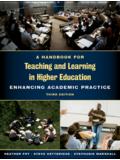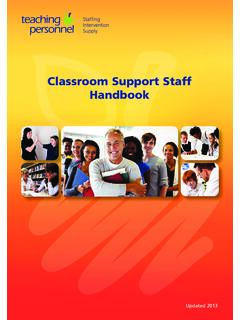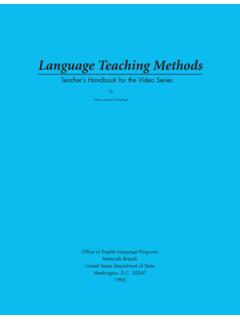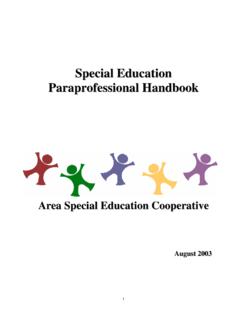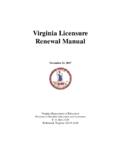Transcription of Grade 11-12 Curriculum Handbook IB Diploma Programme
1 IB Diploma Programme 2014 - 2016 | 1 Grade 11-12 Curriculum HandbookIB Diploma ProgrammeUnited Nations International School of Hanoi2 | Grade 11-12 Curriculum HandbookVALUES & BELIEFSB ecause UNIS Hanoi values LEARNING, UNIS Hanoi believes that we: Learn, think and reflect critically in an inspiring environment, using a dynamic Curriculum that exceeds international standards; Use and apply knowledge in the classroom and beyond for life-long personal development, as we strive for happy, balanced lives; Question and research collaboratively to seek innovative solutions for local and global UNIS Hanoi values COMMUNITY, UNIS Hanoi believes that we: Pro-actively connect with others to make supportive, long-lasting and diverse friendships; Take action to create a safe, caring, and sustainable environment; Respect and appreciate diverse cultures, beliefs and languages to deepen our understanding of local and global UNIS Hanoi values RESPONSIBILITY, UNIS Hanoi believes that we: Act with integrity to make and defend reasoned decisions based on respect, compassion and fairness; Take ownership and are accountable for our thoughts, actions and their consequences; Face challenges with courage, resilience and an independent spirit, whilst remaining responsive and adaptable to change.
2 MISSION & GUIDING PRINCIPLES Our mission is to encourage students to be independent, lifelong learners who strive for excellence and become responsible stewards of our global society and natural environment, achieved within a supportive community that values diversity and through a Programme reflecting the ideals and principles of the United Nations. The United Nations principles as applied to the school are to: Promote peaceful solutions to problems. Develop friendly relations among children and adults of different nationalities. Promote cooperation in problem solving in economic, social, cultural, and humanitarian matters. Encourage respect for fundamental freedoms and equality for all, without distinction as to race, sex, language or Our learning community will be an inspirational role model for a better world IB Diploma Programme 2014 - 2016 | 3 IB LEARNER PROFILEThe aim of all IB programmes is to develop internationally minded people who, recognizing their common humanity and shared guardianship of the planet, help to create a better and more peaceful world.
3 The IB learner profile represents 10 attributes valued by the IB and UNIS IB LEARNERS wE StRIVE t O BE:INQUIRERSWe nurture our curiosity, developing skills for inquiry and research. We know how to learn independently and with others. We learn with enthusiasm and sustain our love of learning throughout life. KNOwLEDGEABLEWe develop and use conceptual understanding, exploring knowledge across a range of disciplines. We engage with issues and ideas that have local and global significance. tHINKERSWe use critical and creative thinking skills to analyse and take responsible action on complex problems. We exercise initiative in making reasoned, ethical express ourselves confidently and creatively in more than one language and in many ways. We collaborate effectively, listening carefully to the perspectives of other individuals and act with integrity and honesty, with a strong sense of fairness and justice, and with respect for the dignity and rights of people everywhere.
4 We take responsibility for our actions and their critically appreciate our own cultures and personal histories, as well as the values and traditions of others. We seek and evaluate a range of points of view, and we are willing to grow from the show empathy, compassion and respect. We have a commitment to service, and we act to make a positive difference in the lives of others and in the world around approach uncertainty with forethought and determination; we work independently and cooperatively to explore new ideas and innovative strategies. We are resourceful and resilient in the face of challenges and understand the importance of balancing different aspects of our lives intellectual, physical, and emotional to achieve well-being or ourselves and others. We recognize our interdependence with other people and with the world in which we thoughtfully consider the world and our own ideas and experience.
5 We work to understand our strengths and weaknesses in order to support our learning and personal | Grade 11-12 Curriculum HandbookUNIS HANOI VALUES, MISSION & VISIONIB LEARNER PROFILEBACKGROUND INTERNATIONAL BACCALAUREATE Diploma Programme IB Diploma Programme SUBJECTS IB Diploma Programme CORE REQUIREMENTSAWARD OF THE IB DIPLOMASUBJECtS OFFERED At UNIS HANOI GROUP 1- StUDIES IN LANGUAGE AND LItERAtURE Language A- Literature Language A - Language and Literature Self-Taught Language A: Literature GROUP 2- LANGUAGE AQUISItIONL anguage B Language ab initio (available at SL only) GROUP 3- INDIVIDUALS AND SOCIEtIES Economics History Psychology Business and Management Environmental Systems and Societies (ESS) (available at SL only)GROUP 4: EXPERIMENtAL SCIENCE Biology Chemistry Physics Computer Science Environmental Systems and Societies (ESS) (available at SL only)GROUP 5- MAtHEMAtICS Mathematics (HL) Mathematics (SL)Mathematical Studies (SL) GROUP 6- tHE ARtS Theatre Film Music Visual Arts tHEORY OF KNOwLEDGE, EXtENDED ESSAY AND CREAtIVItY, ACtION AND SERVICE (CAS)Theory of Knowledge (TOK) Extended Essay Points Calculation for TOK and Extended Essay Creativity, Action and Service (CAS) 2355568101214161820222425272931333435363 73839404244444445 Table of ContentsIB Diploma Programme 2014 - 2016 | 5 BackgroundINtERNAtIONAL BACCALAUREAtE Diploma PROGRAMMEThe International Baccalaureate Diploma Programme (IBDP) is an academically and personally challenging two-year pre-university course.
6 It provides students of different linguistic, cultural and educational backgrounds with the self-awareness and the intellectual, social and critical perspectives that will be necessary for the adult world. The IBDP is a high-quality Programme , designed and monitored by educationalists and drawn from the best practices of education systems in many countries. It is highly respected by schools and universities throughout the worldIB Diploma Programme SUBJECtSThe IBDP involves choosing three subjects to study in detail at Higher Level (HL) and three subjects at Standard Level (SL). Students must select six subjects by choosing one from each of the groups. IB Diploma Programme CORE REQUIREMENtSIn addition, the Programme has three core requirements that are included to broaden the educational experience and challenge students to apply their knowledge and understanding.
7 They contribute to the unique nature of the IBDP, with compulsory participation required in:1. Creativity, Action and Service (CAS).2. The Extended Essay, which demands independent research under appropriate Theory of Knowledge, which explores the relationship between the disciplines and ensures that students engage in critical reflection about knowledge and experience acquired both within and beyond the IBDP subjects have a balance of coursework that is externally assessed by examination and internally assessed work that is externally moderated. The proportion of the final Grade determined by each varies amongst | Grade 11-12 Curriculum HandbookAwARD OF tHE IB DIPLOMAB elow is a selection of some IBDP rules relating to the IB Diploma . Performance in each of the six IB Diploma subjects is graded on a scale of 1 point (minimum) to 7 points (maximum).
8 A maximum of 3 points is awarded for combined performance in Theory of Knowledge and the Extended Essay. (see bonus points matrix) The maximum total Diploma Programme point score is therefore 45. Submission of an Extended Essay and the Theory of Knowledge components is compulsory for award of the of awardFrom the May 2015 examination sessionFrom the May 2015 session the following failing conditions and associated codes will replace those in current CAS requirements have not been Candidate s total points are fewer than An N has been given for theory of knowledge, extended essay or for a contributing A Grade E has been awarded for one or both of theory of knowledge and the extended There is a Grade 1 awarded in a Grade 2 has been awarded three or more times (HL or SL).7. Grade 3 or below has been awarded four or more times (HL or SL).
9 8. Candidate has gained fewer than 12 points on HL subjects (for candidates who register for four HL subjects, the three highest grades count).9. Candidate has gained fewer than 9 points on SL subjects (candidates who register for two SL subjects must gain at least 5 points at SL).A maximum of three examination sessions is allowed in which to satisfy the requirements for the award of the IB Diploma Programme 2014 - 2016 | 7 School Diploma . These students may apply to universities as a US High School Diploma -holder and are often eligible for direct entry to Australian, Canadian, Dutch, Korean, UK, and US universities. Students will, however, often need to meet minimum Grade and testing requirements (such as the SAT). Some universities may require that students first complete a foundation Programme before being granted direct entry to certain courses.
10 When planning an IBDP course, students should bear the following in mind: The same subject cannot be taken at both HL and SL The same language cannot be taken in both Group 1 and Group 2 The IB, at its discretion, occasionally gives special permission for three sciences to be taken if the student concerned has no choice but to do this for university entrance. Documentary evidence of such a requirement must be given to the IBDP coordinator who will forward it to the IB Office and request permission. The IBDP will not allow three sciences to be taken without this written evidence A student who is bilingual may take two Language A courses SL subject availability is not guaranteed; if insufficient numbers of students opt for a subject it may not be offered or if the class is already full, students may not be able to choose the subjectIB Diploma recognition by universitiesInternational recognition of the IB Diploma Programme is outlined on the IB s website, strongly encourage all students to check university IB recognition policies for individual countries on this intending to study at Dutch, French, German, Italian, Swiss, or Asian universities must check country and university-specific requirements when selecting Diploma subjects, because these countries tend to have special Diploma Course candidates and IBDP Course CertificatesInstead of taking a full IB Diploma .

